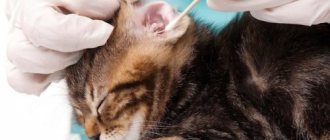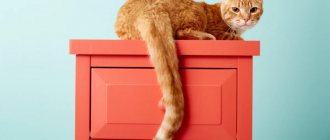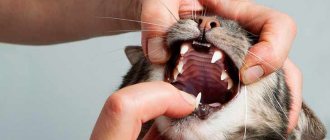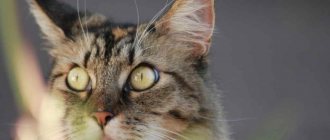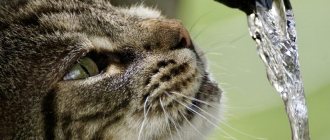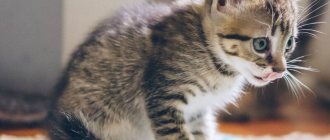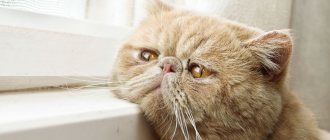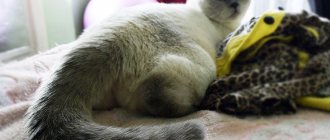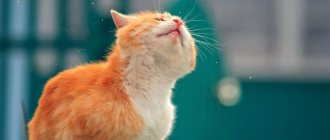Eating problems
Sometimes owners do not pay much attention to what they feed their pet. If the diet is too monotonous, the question may later arise of what to do if the cat loses its appetite. Obviously, the animal may get tired of the same food over time, so the cat will be extremely reluctant to eat it. Then it is enough to introduce new components - feed or familiar homemade food.
© shutterstock
Another problem is insufficiently high-quality products, for example, sausages, pates of dubious composition, cheap food from little-known manufacturers, etc. It is important to pay attention to the composition and, if necessary, consult a veterinarian. It is possible that even some normal foods are contraindicated for your cat due to the characteristics of the digestive system.
How long can a cat go without eating? What are the dangers of starvation?
A healthy adult cat can fast without health problems for up to 5 days, an aging animal - no more than three, a kitten - a maximum of a day, an animal with a chronic disease - no more than two days.
These are approximate dates, taking into account that the animal drinks enough these days. Longer fasting or fasting while refusing to drink is dangerous for the life of a pet.
A kitten under 6 months of age can die within 24 hours of fasting, so if the kitten does not eat, it must be force-fed.
In addition to the risk of death, refusing to eat can cause the following health problems:
- severe weight loss;
- exacerbation of any chronic diseases;
- avitaminosis.
Nervous system disorders
This is another common reason why a cat has no appetite. Cats and cats are quite sensitive animals. They react to almost any significant change in lifestyle, and sometimes the pet’s reaction can be unpredictable. Obviously, some situations are likely to cause stress, which explains why I lost my appetite :
- Moving to a new place. For example, a kitten that has been separated from a cat and settled in a new home is at risk.
- Long, hours-long journey.
- The arrival of a new pet.
- Birth of a child.
- Dangerous situations (for example, a fight with a cat, the threat of a dog attack, etc.).
- Insufficient attention from the owner, conflict atmosphere.
- Long-term absence of the owner (it is known that cats very often become attached to a specific person and do not like change).
In rare cases, cats lose their appetite even due to harmless reasons - changing the bowl, changing the location of the toilet or rest area. Therefore, it is worth analyzing whether there were any significant changes the day before. If the reason for loss of appetite is related to stress, it is necessary to give your pet as much attention as possible.
© shutterstock
Causes
Each of the different types of dysphagia is caused by different factors.
Oral dysphagia may be caused by:
- Paralysis of the jaw or tongue
- Muscle swelling
- Mouth injury
- Dental disease or infection
Pharyngeal dysphagia may be caused by:
- Cancer
- Enlarged lymph nodes near the throat
- Abscesses
- Inflammation of the pharynx
Cricopharyngeal dysphagia may be caused by:
- Tight or wasted muscles
- Nerve damage
In some cases, the reason why a cat cannot swallow may be neurological. If your cat suffers from a brain disease or rabies, dysphagia may be one of the side effects of this condition.
Food poisoning
Cats suffer from decreased appetite for obvious reasons related to eating disorders. As a rule, several symptoms are observed at once :
- nausea and vomiting;
- loose stools;
- general weakness of the animal;
- loss of activity, drowsiness, etc.
If this situation continues for more than a day, exhaustion is observed, it is better to contact a veterinary clinic: you will need to take medications.
Symptoms of Difficulty Swallowing in Cats
There are three types of dysphagia, each of which can present with specific symptoms.
Oral dysphagia
- Struggling to open the mouth or keep food in the mouth
- Collect food from the sides of the mouth
- Throws back head to eat
© shutterstock
Pharyngeal dysphagia
- Repeated attempts to swallow
- Gagging
- Coughs
- Drooling
- Blood stains in saliva
- Excessive chewing before attempting to swallow
- Unusual movements of the neck and head while eating
Cricopharyngeal dysphagia
- Regurgitation of food
- Weight loss
- Loss of appetite
- Repeated attempts to swallow
- Gagging
Diseases
If your cat has lost his appetite and is lethargic, these may be symptoms of some disease.:
- infections;
- inflammatory processes;
- development of benign or malignant tumors;
- dysfunction of the liver, intestines or stomach;
- oral diseases.
Such pathologies lead to anorexia (complete lack of appetite), which can lead to depletion of the body. Therefore, if your appetite has disappeared for no apparent reason. You should immediately contact a veterinary clinic for examination.
© shutterstock
Why doesn't the cat eat? — 10 reasons for a cat’s lack of appetite
Lack of appetite in a cat is a sign of poor health of the animal. There can be many reasons for lack of appetite, and a cat may also stop eating as a result of some illness. But don’t panic if your pet has a slight decrease in appetite for several
their days.
So, let's look at the most common causes of loss of appetite in a cat:
- A sudden transition to unusual or new food. Like humans, animals have their own taste preferences. And a sudden change in diet can cause loss of appetite. Therefore, if you decide to switch your pet to a new food, it is better to do it gradually;
- Weather. When it's hot outside, even a cat with a good appetite can completely forget about food. In this case, you should not force feed the animal; it is better to give your pet more clean drinking water;
- Stress. Cats are very sensitive animals; they can experience stress, anxiety, and fear. In a stressful situation, a cat may refuse food for a while. If the source of the animal’s distress cannot be excluded, then the owner should be attentive and involved in the pet’s life during this difficult period. You may need to consult a veterinarian. He will give recommendations on caring for the animal or prescribe sedatives;
- Dirty bowl. As you know, cats are very clean animals and a dirty bowl or dried food with an unpleasant odor can ruin your pet’s appetite. But this is not the most dangerous thing, because a dirty bowl can cause the development of certain diseases in an animal;
- Presence of worms or external parasites. Parasites, both external and internal, cause discomfort to the animal. As a result, the cat may lose its appetite. To avoid this, you should regularly treat your pet for parasites and keep the tray and bowl clean;
- A surge of hormones. During pregnancy, heat, and puberty, your cat may temporarily refuse to eat. A hunger strike can last for several days or even a week. Cats, not male cats, are most susceptible to this. If hormones are the reason for refusing to eat, there is no need to sound the alarm; your appetite will return on its own;
- Accumulation of hair in the stomach. Cats constantly lick themselves, and this leads to a buildup of fur in their stomach. This problem is especially acute if the owner does not pay due attention to combing his pet. In addition to lack of appetite, the accumulation of hair in the stomach can lead to stomach and intestinal upset;
- Diseases of internal organs. Loss of appetite can result from many diseases: tumors, diabetes, kidney and liver diseases, stomach diseases, etc. If loss of appetite for 1-2 days is accompanied by other alarming symptoms, you should immediately contact your veterinarian;
- Viral or bacterial infection. Even if the cat does not leave the apartment, he can catch the infection. If the animal has become lethargic and apathetic, you should be wary. Lack of appetite during illness is natural, and if your pet has lost its appetite precisely as a result of illness, you should not let the illness take its course. You need to contact your veterinarian immediately;
- Anorexia. Anorexia develops in an animal due to loss of smell or touch. In the most severe situations, your veterinarian may recommend tube feeding. If there is loss of appetite due to anorexia, it will not be possible to cure a cat without the intervention of a veterinarian. Anorexia is a serious disease and should be treated by a professional.
If a cat is not eating due to illness, this can often be determined by the animal's appearance. An attentive owner will always notice if something is wrong with his pet. A timely visit to the veterinarian will not only identify, but also eliminate the cause of the cat’s lack of appetite.
What to do
The treatment plan for dysphagia will depend on the underlying cause. If an infection is causing the problem, antibiotics will be prescribed, but if the problem is inflammation, steroids may be prescribed instead. Both of these medications may need to be administered to your cat at home for up to ten days.
If a tight or contracted muscle is causing your cat to gag and cough, your veterinarian may prescribe muscle relaxers to help the muscle relax and allow your cat to swallow.
If the cause is some kind of structural damage or abscess, surgery may be required to correct the problem.
If the biopsy shows that there are cancer cells in the abscesses, your veterinarian will discuss various chemotherapy and radiation treatment options with you.
Finally, dental disease may need to be treated by removing infected teeth and administering antibiotics.
What should an owner do if a cat doesn’t eat well?
If the cat feels cheerful and cheerful, has normal bowel movements, and the hunger strike lasts no more than 2 days, then the owner can be calm. It would be a good idea to try to gradually introduce some new foods into the diet, depending on what your cat’s diet is. If the animal eats natural food, then it makes sense to offer it some new but healthy products. If your animal's menu included industrial food, you can purchase a new type - for cats that are picky eaters. But any food should be introduced gradually and the animal should not be forcefully fed.
At the pet store you can buy sprouted grass, vitamin complexes, and special cat treats, especially during the changing seasons. Do not neglect preventive vaccinations, deworming, and prevention of external blood-sucking parasites. In short, the owner should not sound the alarm if the cat is apparently healthy and the refusal to eat continues for several (1-3) days. But any symptoms of ill health should always be noticed by the owner and serve as a reason to contact a specialist so that the reason why the cat is not eating well can be identified and eliminated.
Types of dysphagia
This disorder in cats can be classified according to several criteria.
For example, according to the principle of anatomical and functional disorders:
- anatomical defects that impede the passage of food and liquid, and they can be congenital or acquired;
- functional problems that are determined by a motor disorder of the swallowing process.
Highlight:
- oral;
- pharyngeal or pharyngeal;
- and esophageal swallowing disorder.
With an oral swallowing disorder, the animal is unable to grasp food and form the usual food bolus at the base of the tongue. Food accumulates in the folds of the animal's oral mucosa. The cat chews the piece placed in its mouth for too long, shakes its head and throws it up, thus trying to move the food bolus. Crusts form on the animal's face, but there is no vomiting, and adaptive behavior allows the pet to at least somehow eat.
Swallowing is a reflex act; if, when the root of the tongue is irritated by a food bolus, this reflex is not excited, then attempts to swallow food cause a gag reflex, the food bolus returns to the oral cavity or enters the animal’s nose. This type of dysphagia is called pharyngeal dysphagia. There are several types of this disorder:
- impaired contraction of the muscles of the pharyngeal ring;
- pathology of pharyngeal closure;
- lack of opening of a special valve (esophageal sphincter) formed by the cricopharyngeal and cricopharyngeal muscles.
With this disorder, the animal regurgitates a bolus of food (even several hours after trying to eat). A cat with this disorder loses weight because it is unable to move food even with the help of adaptive behavior.
With esophageal disorder, the animal can push the bolus of food into the esophagus, but after a while vomiting occurs. The cat is coughing and regurgitating food. Such an animal quickly loses weight and becomes dehydrated.

